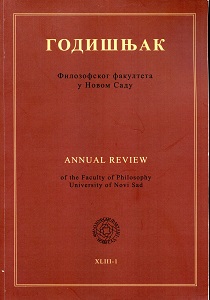FRAZEMI SA SOMATIZMOM GLAVA U FRANCUSKOM, ŠPANSKOM I SRPSKOM JEZIKU
PHRASEMS WITH SOMATISM HEAD IN FRENCH, SPANISH AND SERBIAN
Conceptual field ‘human characteristics’
Author(s): Ksenija Šulović, Dragana Drobnjak, Snežana GudurićSubject(s): Language studies, Language and Literature Studies
Published by: Филозофски факултет, Универзитет у Новом Саду
Keywords: head; phraseology; conceptual field ‘human characteristics’; French; Spanish; Serbian
Summary/Abstract: This paper deals with French, Spanish and Serbian phrasemes with the lexeme Fr. tête / Sp. cabeza / Ser. glava that qualify human personality and intelligence and one`s physical and moral traits. By using the method of contrastive semantic analysis, the aim of this study was to determine the extent of the lexical and semantic structure of the extracted 174 examples as well as the (non) matching of the concepts they express. A lexical and semantic matching in three languages was found in 15 cases (45 phrasemes), while the same matching in two languages was noted in only 13 cases (26 phrasemes). In the three languages, the head is not conceptualized in the same manner, which is demonstrated by zero equivalence in a large number of examples (104). Such an imageis unusual since somatismes are largely based on the mapping of properties of the human body, which is universal. The large number of non-equivalent phrases is due to the fact that several phrasemes of identical semantics but different lexical realizations describe different individual traits (e.g. wit, lack of reason, stupidity).The most numerous are phrasemes that qualify human character and its intellectual properties and activities, while those which express human physical appearance and moral characteristics occur in a far smaller number. In the three languages, the phrases observed reveal primarily negative traits of a person's character (stubbornness, recklessness, being scatterbrained, superficiality, irritability), as well as poor intellectual ability. Numerous phrasemes carry a negative connotation towards one`s physical appearance, and compare it to the appearance of an animal, the shape of an object or a piece of fruit. Some of the undesirable features were noted only in French (rebelliousness, fearfulness, impudence, ruthless exposure to risk), only in Spanish (lack of courtesy or ideas, cowardice) or only in Serbian (scheming, hypocrisy). Desirable properties (attachment, rationality, persistence, cold bloodedness) are present in a small number of cases.In all the phrasemes analyzed, the background image is easily visible, understandable and predictable.
Journal: Годишњак Филозофског факултета у Новом Саду
- Issue Year: 43/2018
- Issue No: 1
- Page Range: 337-356
- Page Count: 20
- Language: Serbian

